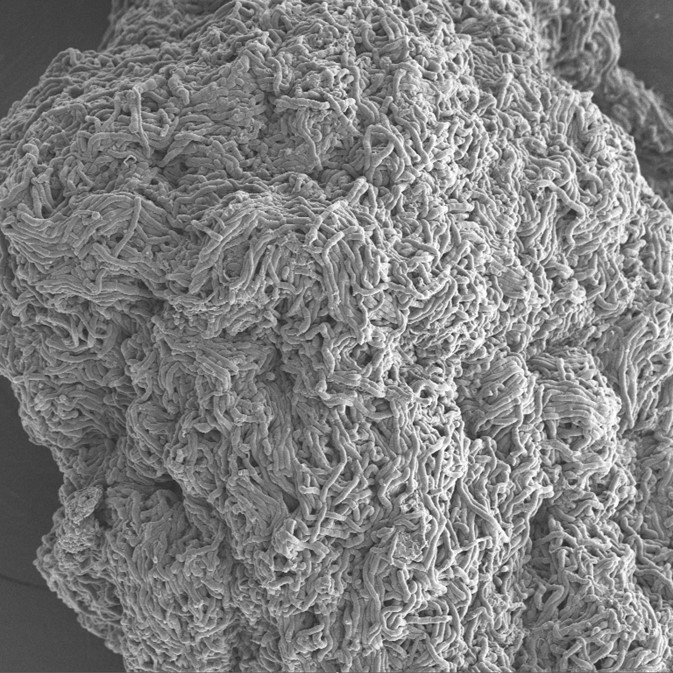Mosquera, Cundinamarca. April 3, 2023. The research carried out by Jennifer Lorena García Riaño, a research support professional at the Tibaitatá Research Center of AGROSAVIA, in the development of her M.Sc in Chemistry at Universidad Nacional de Colombia, was recognized as a laureate thesis thanks to the enormous contribution for the future of bio-inputs based on entomopathogenic fungi.
Currently, there is a growing demand and need for new bio-inputs that are more efficient, stable in storage, resistant to abiotic stress conditions, and persistent in the field capable of replacing agrochemicals to protect crops in an environmentally sustainable way. In this sense, this research established the conditions to induce the production in liquid fermentation of a fungal resistance structure called microsclerotia, which could contribute to overcoming the current limitations of fungal bio-inputs.
The research results related to microsclerotia production and use open the door to developing a new generation of fungal-based bio-inputs in the country. These microsclerotia-based products could be cheaper as the fermentation type changes from solid to liquid, but, essentially, because they are more stable in storage, more persistent in the field, and more effective for pest control as they can function as sustained release systems of infective propagules (conidia) in the field. From this point of view, the contributions of this research are of great value for the bio-inputs industry in Colombia and for farmers, who will be able to depend on new, more efficient bio-inputs in the future.
Jennifer expressed, "This achievement fills me with great pride and immense gratitude to those who trained me during my master's degree. My mentors, Dr. Laura Villamizar (AgResearch), Dr. Gloria Barrera (AGROSAVIA) and Dr. Leonardo Castellanos (UNAL)."
The thesis title is "Study of the microsclerotia formed by the entomopathogenic fungus Metarhizium robertsii Mt004: Production, characterization, and insecticidal activity." This study aimed to establish the conditions to artificially induce the formation of "microsclerotia" of a Colombian strain of the entomopathogenic fungus Metarhizium robertsii. Microsclerotia are resistant fungal structures that, under suitable conditions, can produce conidia and infect pest insects.
Further, Jennifer pointed out, "Most bio-inputs based on entomopathogenic fungi use conidia as the active ingredient, which are asexual reproduction structures and an infective form of entomopathogenic fungi. In our thesis, we proposed using microsclerotia as an alternative structure, as they are much more resistant structures than conidia with the capacity to produce conidia in a sustained manner."
Microsclerotia are not produced naturally by this fungal species. Very specific stress conditions are required for their induction. M. robertsii microsclerotia proved to be highly resistant to abiotic stress conditions such as temperature and ultraviolet light, which could ensure high persistence in the field. Furthermore, microsclerotia were capable of producing highly infective conidia, which did not differ in virulence when compared to conidia produced in solid fermentation.
According to Jennifer, "The results of this thesis allowed us to conclude that the M. robertsii microsclerotia produced in liquid fermentation are robust and stable fungal propagules, which, when found in adequate humidity conditions, are capable of germinating and producing millions of infective conidia. We also demonstrated that, during microsclerotia formation, the fungus produces about 26 metabolites recognized for their potential insecticidal activity, evidenced when evaluating the culture broth in laboratory bioassays. Considering that the production of M. robertsii microsclerotia and their metabolites in liquid fermentation is a simple, scalable, replicable, and easily controlled process, the study concluded that this technology would be ideal for the future development of a new generation of biopesticides with greater efficiency and technical and economic feasibility".
The thesis is currently available in the repository of Universidad Nacional de Colombia, and a scientific article on this document will soon be published. Click here to access the thesis.
- More information here:
- María Elena Londoño Rubio
- Communications, Identity and Corporate Relations Professional
- Research Center Tibaitatá
- Communications, Identity and Corporate Relations Advisory Office
- melondono@agrosavia.co
- AGROSAVIA





